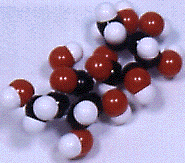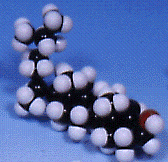
General Disclaimer
This Web project was developed as part of "Internet Resources" courses offered by the Biology and Geology departments of the California State University, Los Angeles in 1995 and 1996. It was submitted to the instructors for evaluation and then placed on-line by the Electronic Desktop Project (EDP). EDP does not update or maintain any of the material of this project, and does not vouch for validity or correctness. Furthermore, the student developing this project was instructed about the rules of copyrights. EDP can in no way be responsible for the inclusion of copyrighted material within this project.
Organic Geochemistry and Environmental Geochemistry Resources on the 'Net
An Interdiscipinary Approach
by Steven Pencall
Geology 491
California State University, Los Angeles
Winter, 1995
Organic geochemistry, sometimes called petroleum geochemistry, has moved beyond the simple characterization and quantitation of organic species present in a naturally occuring hydrocarbon mixture, to attempt to answer fundamental questions about the geological history of those mixtures, which we know as oil and natural gas.
Organic geochemistry examines generally ancient geological materials for clues to the source of hydrocarbons and related organic compounds, their migration path(s), organic maturity of the source(s), biodegradation of reservoired hydrocarbons, age of generation, and length of time hydrocarbons have resided in a given reservoir. It also attempts to answer questions about the thermal history of source rocks and reservoired hydrocarbons, as this is perhaps the single most important factor controlling the generation and preservation of hydrocarbons, given the presence of a suitable source.
The success of geoscientists in finding and producing hydrocarbons, and their universal utilization in technological civilization, has contributed to the release of a variety of petroleum-derived organic compounds into the natural and human environment in significant quantities. The potential for environmental harm caused by these substances has led to the employment of a variety of analytical and predictive techniques which are similar to those pioneered by organic geochemists engaged in the search for oil and gas. The principle differences between environmental geochemistry and organic geochemistry involves the age of the samples, which are generally recent, and the species sought, which are generally simpler than the complex molecules sought by the organic geochemist.
The more prominent presence of environmental geochemistry on the Internet should not be taken to indicate that it is a more vital or important branch of geochemistry, but is instead indicative of the value placed on organic geochemistry by the petroleum industry--hence the confidential nature of much of the work in that field.
PLEASE NOTE: The following is not meant to be a comprehensive or all-inclusive listing of all the resources that were consulted for this project, merely a selection, admittedly biased, of the more useful or impressive sites visited.
Petroleum-Oriented Geochemistry Resources

One of the world's most active research programs in organic geochemistry is carried on by the Newcastle Research Group at the University of Newcastle-Upon-Tyne in the U.K.
At the University of Newcastle is Bryn Jones, one of the leading researchers in the field. His HomePage displays an extensive list of his recent publications. Dr. Jones serves as moderator for the ORG-GEOCHEM electronic discussion list described below.
Also represented by similar HomePages are his colleagues at Newcastle, including Martin Jones, Richard Tyson, and several others.
The Global Basins Research Network (GBRN) was founded in 1990 to model the movement of fluids in sedimentary basins. It is a consortium of academic institutions and private companies, with support from a number of U.S. and foreign-based oil companies. Click here to view the Brochure on the Global Basins Research Network.
Try this to see if you can obtain any neat images from the supercomputer at GBRN participant Cornell University. NOTE: Several attempts to access this source failed but it may be available from time to time.
ORG-GEOCHEM is an electronic discussion list for organic geochemists, and other scientists with interests in organic geochemistry. Related fields such as environmental geochemistry and petroleum geochemistry are covered. Org-Geochem uses the Mailbase system to manage message distribution. Messages e-mailed to org-geochem@mailbase.ac.uk are automatically distributed by e-mail to other list members. Most messages relate to conference details, research opportunities, and publication information. Some technical messages.
Listings are Archived automatically. Access via e-mail MAILBASE GET command --- send the message: send mailbase user-guide to mailbase@mailbase.ac.uk for instructions on e-mail retrieval)
By anonymous FTP ftp://mailbase.ac.uk>
by Gopher at gopher://mailbase.ac.uk
The UseNet Newsgroup sci.geo.petroleum Contains some postings on organic geochemistry and related topics.
Here is an FTP site at the Massachusetts Institute of Technology where the Usenet newsgroup:sci/geo/petroleum archives are stored.
Sci.geo.petroleum Internet Resources
Comments: May be the single most useful HomePage for earth scientists on the Web.
Earth Science and Geology Links by Category
Comments: Another valuable page; contains geochemistry resources along with links to most of the geoscience resources on the Internet.
Curtin University, Perth, Western Australia has an active program in petroleum organic geochemistry.
Another program in organic geochemistry "down under" is taught at the Research School of Earth Sciences at Victoria University, Wellington, New Zealand.
An interesting course combining petroleum and hydrology, called "Petroleum Hydrology" appropriately enough, is taught by Dr. Joszef Toth at the University of Alberta.
The organic geochemistry of the marine environment is one of the fields of study at the University of Bangor Ocean Sciences Institute in the U.K. NOTE: this is a slow link.
Environmentally-Oriented Geochemistry Resources

Government laboratories, chiefly those of the Department of Energy, have moved aggressively into performing much of the basic science in environmental geochemistry and related fields.
Department of Energy Environmental Restoration Gopher
TheEarth and Environmental Sciences Center at the Pacific Northwest Laboratory at Richland and Sequim, Washington. For an outstanding graphic image of subsurface transport at an arid site (Hanford, WA?) click here. Also check out for further outstanding examples of fluid flow modeling.
Environment and Natural Resources at the Lawrence Livermore National Laboratory
For an overview of facilities at Sandia National Laboratory click here
To view the HomePage of the Environmental Sciences Division at Oak Ridge National Laboratory in Tennesee, click here
The UseNet Newsgroup sci.geo.hydrology Contains a few (very few) postings which touch on environmental geochemistry and related topics, usually in a peripheral way.
The U.S. Geological Survey maintains an extremely useful registry of Earth and Environmental Science Internet resources as a service to the research community.
Our colleagues to the north will not be upstaged, even if they are outspent. For a look at the HomePage of the National Hydrological Research Institute of Canada's Ground Water Research Group click
here.
British Columbia Water Management also has its own Groundwater HomePage
The Earth Sciences and Resources Institute at University of Utah (ESRI) has capabilities in both organic and environmental geochemistry.
NOTE: Curiously enough, although there are hundreds, if not thousands, of private firms engaged in every phase of remediation of organic contaminants in the environment, none seems to be represented on the World Wide Web, or on any of the other online resources that were searched for this project. Certainly, it is not for lack of sufficient computer expertise or resources. One can only speculate about how or why this splendid marketing opportunity has been overlooked.
Finally, although not strictly germane to the subject of this HomePage, every earth scientist who contemplates placing his or her work on the Internet would do well to peruse the information available at the following FTP site maintained by the Computer Oriented Geological Society (COGS).
The following has been added by the Electronic Desktop Project:
 Contact Us
Contact Us
Please take a few minutes to send us your comments and suggestions. We read every message and try to respond promptly to questions. Your feedback will help us improve our project.
If you are an educator who is using our NEXTSTEP or virtual applications in the classroom, we would especially like to hear from you. Let us know what you are doing and how it is working out. Continued support for this project will depend on its impact in science education.
If you are an educator who is interested in making use of our NEXTSTEP or virtual applications, please let us know how we can help.
Other Places To Go
 Return to the Electronic Desktop Project home page
Return to the Electronic Desktop Project home page
 Check out the WWW Virtual Application Catalog from the EDP
Check out the WWW Virtual Application Catalog from the EDP
 Check out the NEXTSTEP Application Catalog from the EDP
Check out the NEXTSTEP Application Catalog from the EDP
 Visit the home page for California State University, Los Angeles
Visit the home page for California State University, Los Angeles




 Contact Us
Contact Us Return to the Electronic Desktop Project home page
Return to the Electronic Desktop Project home page![]() Check out the WWW Virtual Application Catalog from the EDP
Check out the WWW Virtual Application Catalog from the EDP Check out the NEXTSTEP Application Catalog from the EDP
Check out the NEXTSTEP Application Catalog from the EDP Visit the home page for California State University, Los Angeles
Visit the home page for California State University, Los Angeles